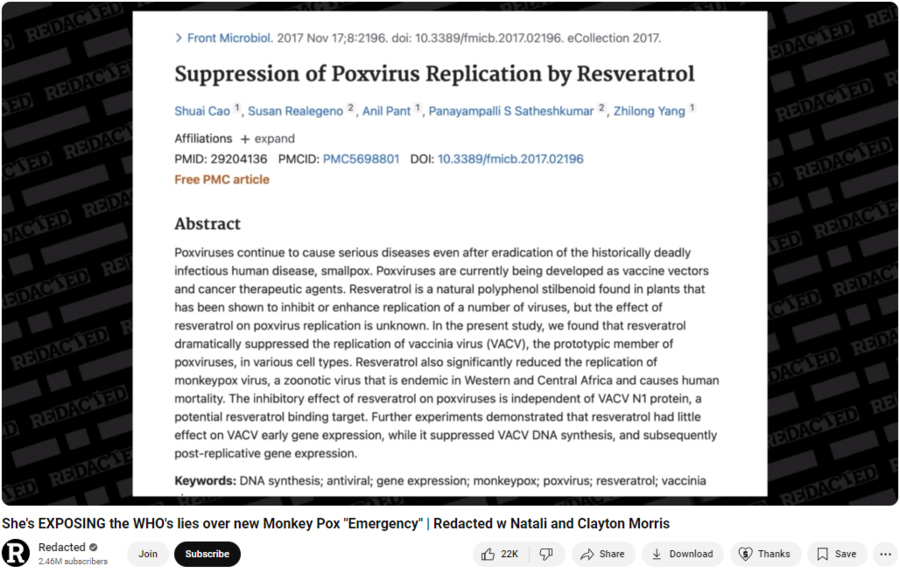
Does a 2017 paper on resveratrol suggest it could be used to stop or treat monkeypox as part of the public health emergency declared in August 2024? No, that's not true: An author of the paper told Lead Stories that resveratrol was never tested on humans or animals in their research, and it's "unclear if it suppresses poxvirus replication." An infectious diseases expert said, "Resveratrol is not a valid treatment for Mpox." The compound is not listed among the available treatments for mpox by the Centers for Disease Control and Prevention.
The claim appeared in a video (archived here) on YouTube on August 18, 2024, under the title "She's EXPOSING the WHO's lies over new Monkey Pox 'Emergency' | Redacted w Natali and Clayton Morris." The video's caption said:
The World Health Organization [WHO] has declared that monkeypox is a public health emergency of international concern (PHEIC). They are calling it mpox now though. This is the second time this has happened in just five years. This time, they say, it is a new strain and it is transmissible in 'different modes of transmission.' They say that they want an emergency vaccine. Well, back the truck up because we have some unanswered questions.
This is what the video looked like on YouTube at the time of writing:
(Source: YouTube screenshot taken on Tue Aug 20 17:06:12 2024 UTC)
The video
The hosts of the podcast begin by discussing mpox and the PHEIC declared by the WHO on August 14, 2024. Mpox is now the preferred term for monkeypox. About 11:45 into the video, Natali Morris refers to a paper published on November 17, 2017, titled "Suppression of Poxvirus Replication by Resveratrol." She suggests the findings of the research hold promise in stopping the spread of the virus. This is what she said:
What I want to point out here is that there is data that shows that there is a naturally occurring compound that maybe could be concentrated to stop the spread of certain pox viruses, such as monkeypox, but oddly enough the WHO does not mention this study or any furthering of studies like this in their calls for an emergency.
Resveratrol is a compound primarily found in red grapes and products made from them. MedlinePlus, a website of the National Library of Medicine, says this about the chemical (emphasis ours):
Resveratrol might have many effects in the body, including expanding blood vessels and reducing blood clotting. It may also decrease pain and swelling, reduce levels of sugar in the blood, and help the body fight against disease.
Resveratrol is most commonly used for high cholesterol, cancer, heart disease, and many other conditions. But there is no strong evidence to support resveratrol for any use.
Study author
Zhilong Yang, an associate professor of veterinary pathobiology at Texas A&M University's School of Veterinary Medicine and Biomedical Sciences and one of the authors of the paper, responded to a Lead Stories email on August 20, 2024, in which we asked whether Morris' assertion was true -- that their article proved resveratrol could stop or treat the current mpox outbreak. He answered (emphasis his):
The work was done in cultured cells and the compound suppressed poxvirus replication. The compound was NOT tested in animal models and humans for its effects on poxvirus infection. It is unclear if it suppresses poxvirus infection in humans and animals.
The bottom line, according to Yang, is that resveratrol reduces the replication of poxviruses in cultured cells. There's no evidence to support anything more than that.
Infectious disease experts
In an August 20, 2024, email, Dr. Daniel Kuritzkes, chief of the Division of Infectious Diseases and professor at Harvard Medical School, said resveratrol is not known to be a legitimate treatment for mpox. He added:
There is no evidence from human clinical trials that resveratrol is effective in treating mpox (or any of the other viruses for which activity is claimed).
The paper in question does show some antiviral activity of resveratrol in cell culture, but the concentration of drug required is rather high (50 micromolar).
No data are provided on what are achievable blood concentrations of resveratrol or how much would need to be administered to achieve those concentrations.
Dr. Mark Rupp, chief of the Division of Infectious Diseases and a professor at the University of Nebraska Medical Center, echoed Kuritzkes, saying this about resveratrol:
Like many chemicals, there is evidence that it can suppress certain viruses, including mpox, in laboratory tests. There is not good evidence that resveratrol results in clinical benefit in persons infected with mpox, it is not FDA-approved. At this time, Resveratrol is not a valid treatment for Mpox.
Centers for Disease Control and Prevention
The Centers for Disease Control and Prevention (CDC) website says "Mpox is often transmitted through close, sustained physical contact, and during the outbreak that began in 2022, most frequently, sexual contact."
Kuritzkes added these details about how mpox is spread. He said:
In some circumstances heavily contaminated material such as bedding can cause infection, as can contact with infected animals (very unlikely to occur in the US). Airborne transmission is very uncommon.
Treatments
As of August 20, 2024, there was not an FDA-approved treatment for mpox. However, the antiviral drugs tecovirimat (TPOXX) and brincidofovir (Tembexa) have shown promise. Details are available on the CDC website.
Prevention
The CDC recommends getting vaccinated against mpox with JYNNEOS, the only FDA-approved shot for the virus, if:
- You were exposed to someone with mpox.
- You had a recent sex partner diagnosed with mpox. You are a gay, bisexual, or other man who has sex with men, or a transgender, nonbinary or gender-diverse person, and in the past six months, you:
- Had a new sexually transmitted disease (STD) diagnosis.
- Had more than one sex partner.
- Had sex at a commercial venue or event where mpox is spreading.
- Had a sex partner with any of these risks.
- Expect to encounter any of these situations.
- You work in a lab or health care setting with a risk of exposure to orthopoxviruses.
Read more
Additional Lead Stories fact checks of claims related to mpox can be found here.


















